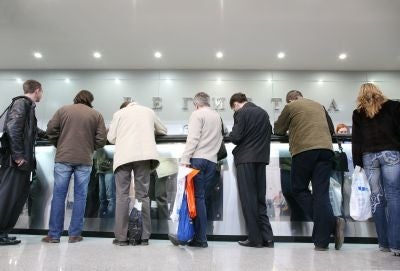Higher airline prices loom under EU emissions scheme

Travellers could see a new charge on their tickets to fly between Europe and North America after the European Union begins forcing airlines to buy carbon emission permits next year.
The EU admitted Monday, as it unveiled rules governing the system, that the scheme could prompt airlines to add between four and 24 euros ($32) to the price of a two-way transatlantic flight.
The EU is pressing ahead with the system despite a court challenge by the US airline industry, which says that it could cost them $3.0 billion dollars over the next 10 years. Chinese carriers have also complained, saying it would cost them an additional 800 million yuan (92.5 million euros, $125 million) a year.
Starting on January 1, the EU will cap the amount of carbon dioxide planes can emit, and carriers will have to buy emissions permits to land or take off in the 27-nation bloc under the Emissions Trading System (ETS).
The EU announced Monday that airlines will receive 85 percent of their emissions allowances free of charge in 2012. The figure will drop to 82 percent per year between 2013-2020, or 172 million tonnes of CO2 annually.
This means airlines will have to buy 15 percent of their permits next year, amounting to 380 million euros. Aviation represents 3.0 percent of annual greenhouse gas emissions in the world.
"At current market prices these free allowances represent more than 20 billion euros over the decade," said EU climate action commissioner Connie Hedegaard.
"With these potential revenues, airlines could invest in modernising their fleets, improving fuel efficiency and using non-fossil aviation fuel," she said.
The actual cost for airlines should be as low as four euros for a two-way trip. But the European Commission said nothing stops airlines from also passing on the cost of the free allowance to customers, which it estimated could amount to 24 euros for a ticket.
It is up to the airlines to decide whether to bill passengers for the extra cost, the commission said, denying that the ETS amounted to a new tax.
The environmental group WWF welcomed the measures announced by Brussels, as "an important step in pricing carbon pollution caused by the aviation sector" even though most of the allowances will be handed out for free.
"This is a modest but important start in reducing international aviation emissions," said WWF climate policy officer Sam Van den plas.
But the permits, he added, "are a gift worth 2.3 billion euros to one of Europe's fastest growing CO2 emitting sectors."
The Air Transport Association of America, together with United Continental and American Airlines, argued before the EU Court of Justice in July that imposing the system on foreign carriers violates international aviation and climate change agreements.
Their lawyer told the judges that it was unfair to charge airlines for emissions that are mostly spewed outside European airspace. He argued that such measures should be taken at the international level instead of unilaterally.
The court's advocate general is due to issue an opinion on October 6. The judges do no have to follow the adviser's opinion, although they do so in most cases.
lth/ccr/rl
Join our commenting forum
Join thought-provoking conversations, follow other Independent readers and see their replies
Comments
Bookmark popover
Removed from bookmarks